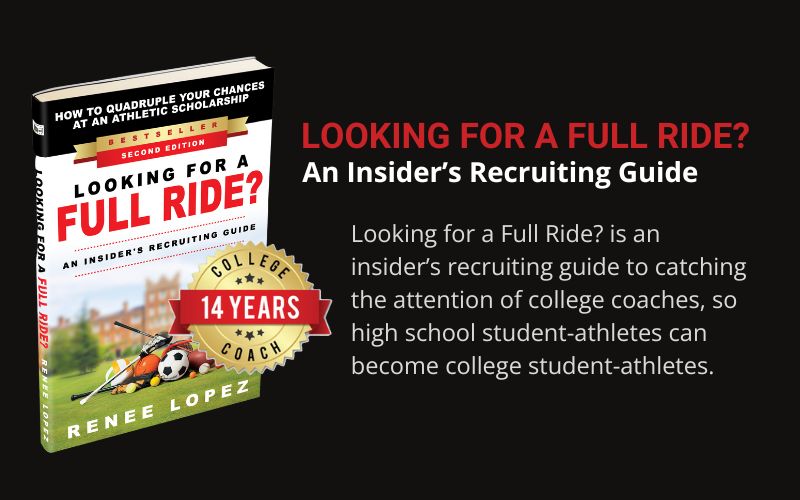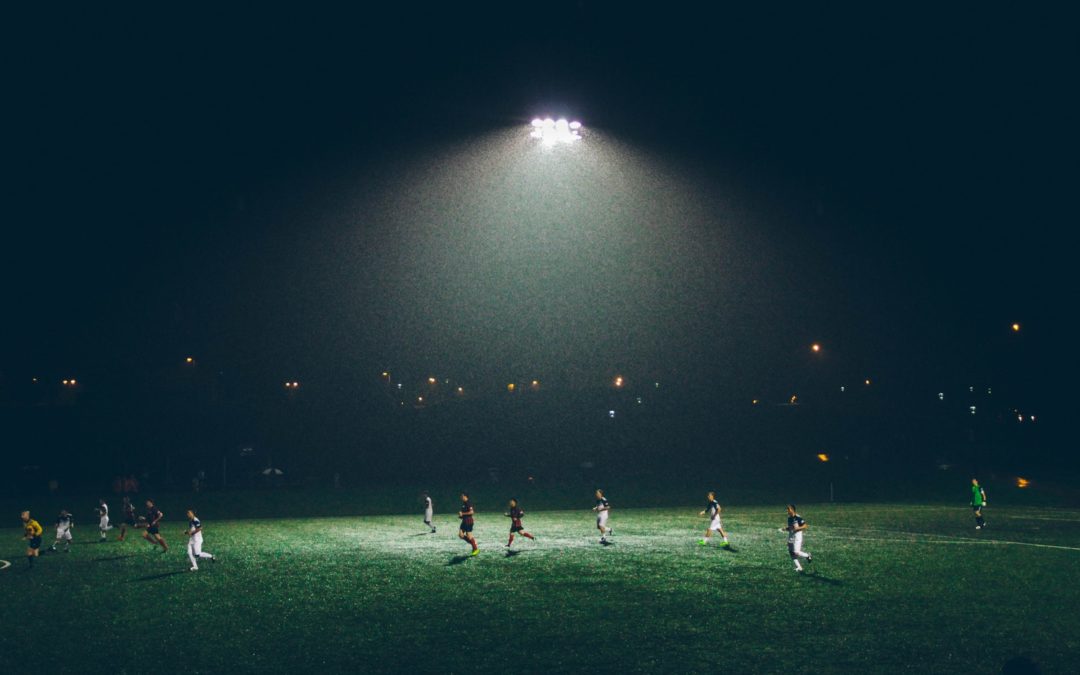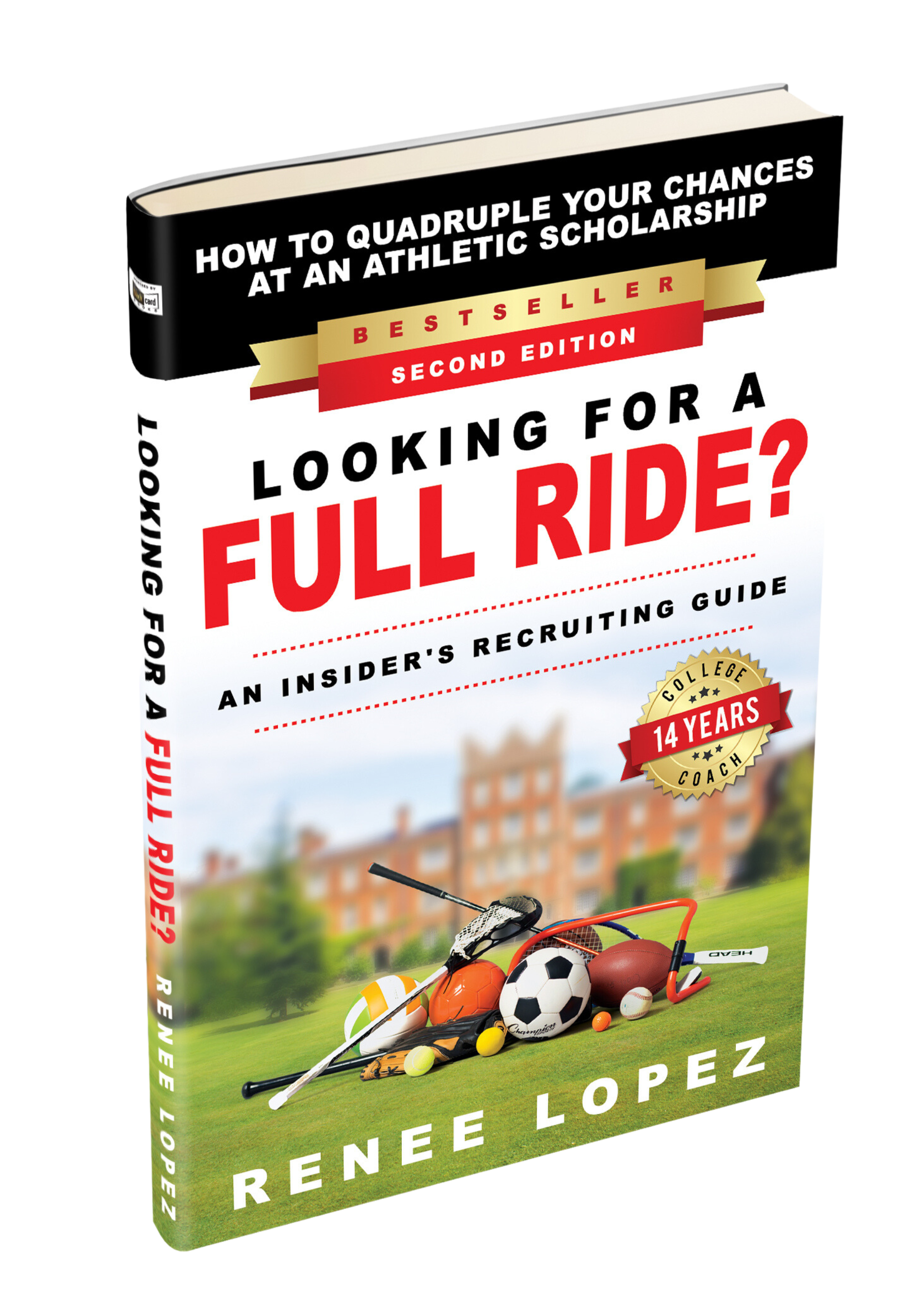5 Important Health Aspects to Consider (Part 1/2)
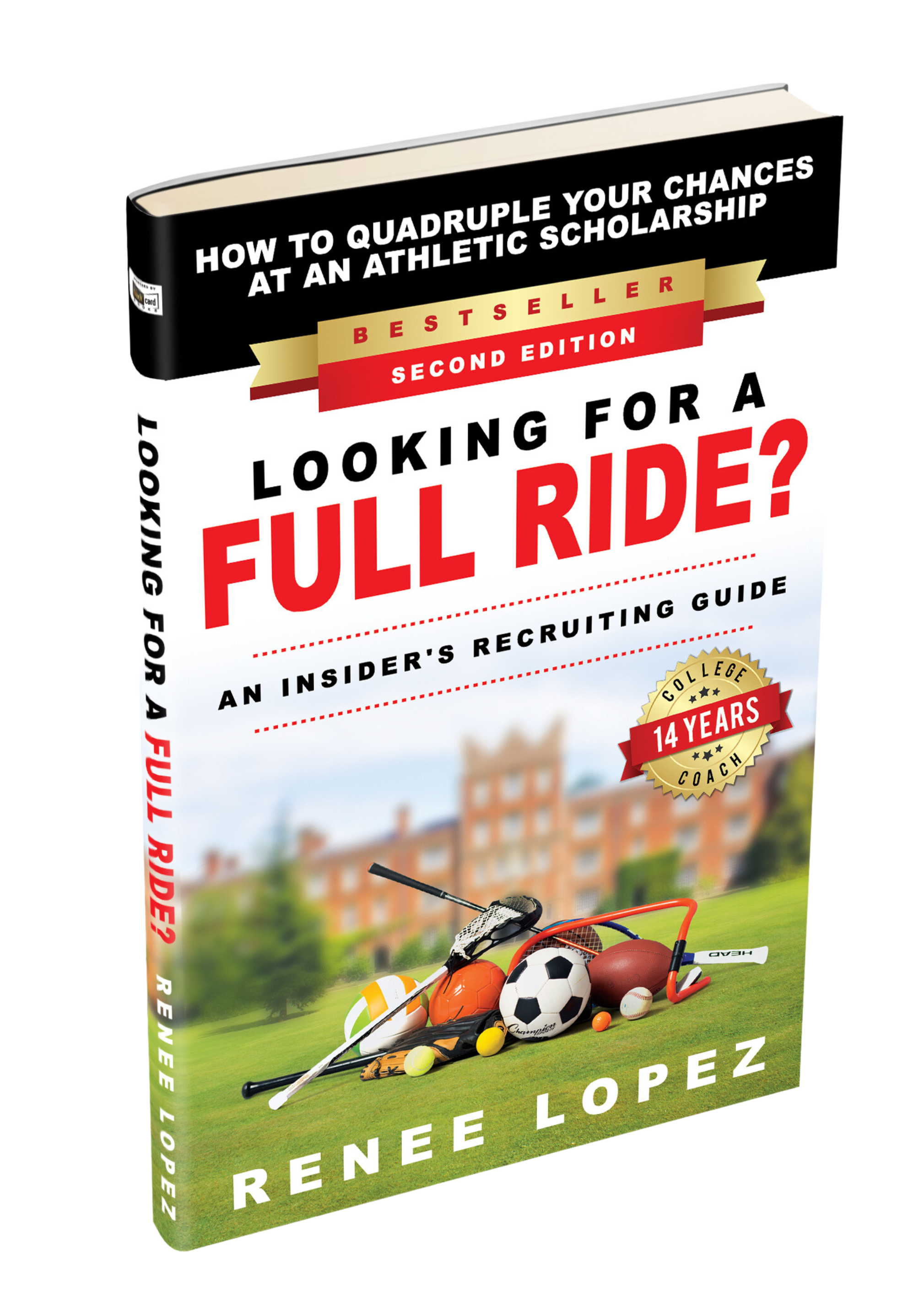 Many student-athletes in team sports utilize a recruiting showcase tournament to get evaluated for a roster spot or athletic scholarship for a college program. In research for my book, Looking For A FULL RIDE?: An Insider’s Recruiting Guide, I interviewed 65 college coaches and athletic directors. The majority of the college coaches (especially in sports such as volleyball, soccer, baseball, softball, lacrosse, field hockey, and basketball) stated they preferred to attend a large showcase with multiple opportunities to evaluate lots of student-athletes over a few days, versus traveling to one high school match and only being able to watch a few potential recruits. However, as student-athletes look to impress the college coaches during these events, it’s very important that they know how to take care of their bodies before, during, and after the events.
Many student-athletes in team sports utilize a recruiting showcase tournament to get evaluated for a roster spot or athletic scholarship for a college program. In research for my book, Looking For A FULL RIDE?: An Insider’s Recruiting Guide, I interviewed 65 college coaches and athletic directors. The majority of the college coaches (especially in sports such as volleyball, soccer, baseball, softball, lacrosse, field hockey, and basketball) stated they preferred to attend a large showcase with multiple opportunities to evaluate lots of student-athletes over a few days, versus traveling to one high school match and only being able to watch a few potential recruits. However, as student-athletes look to impress the college coaches during these events, it’s very important that they know how to take care of their bodies before, during, and after the events.
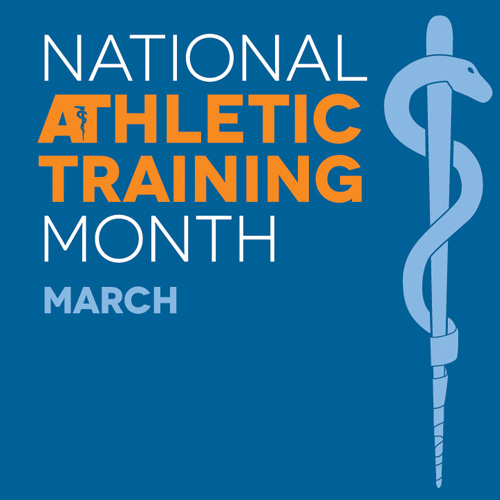 Every March, the National Athletic Trainers’ Association looks to spread awareness about the important work of athletic trainers. For March 2018, the National Athletic Training Month theme is “Compassionate Care for All.” Having been a college coach for 17 years and high school varsity coach for 3 years, I have learned that having quality certified athletic trainers are essential in athletes performing at their best. I am honored to have worked with many highly qualified athletic trainers over the years. I have asked two colleagues (who I have worked with for many years and highly respect), to provide some perspective for student-athletes attending a college recruiting showcase: Arianne Davis and Deanna Rosato Lewis.
Every March, the National Athletic Trainers’ Association looks to spread awareness about the important work of athletic trainers. For March 2018, the National Athletic Training Month theme is “Compassionate Care for All.” Having been a college coach for 17 years and high school varsity coach for 3 years, I have learned that having quality certified athletic trainers are essential in athletes performing at their best. I am honored to have worked with many highly qualified athletic trainers over the years. I have asked two colleagues (who I have worked with for many years and highly respect), to provide some perspective for student-athletes attending a college recruiting showcase: Arianne Davis and Deanna Rosato Lewis.
Here is part one of our interview regarding health aspects in athletics:
1. Impact of Multiple Competitions During a Tournament
Coach Renee Lopez: As college coaches we attend many recruiting showcase events, especially for team sports, where student-athletes will have multiple competitions over the course of a weekend, and often times 2-3 matches in one day. From a certified athletic trainer’s perspective, what do you see the impact of so much time in competition with very short recovery?
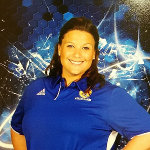 Deanna Rosato Lewis:
Deanna Rosato Lewis:
Honestly, overuse injuries and muscle deterioration are the biggest barriers to performance. As well as concussions….the #1 topic of conversation over the last few years. As these showcases progress, chance of injury increases!
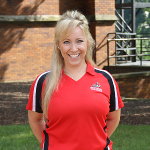 Arianne Davis:
Arianne Davis:
Overuse, nagging aches, pains, or injuries are often an indication of a larger problem. Coaches WILL see this in your movement patterns, but they may not recognize it as an injury. The vast majority of coaches with whom I have worked would rather see a prospect who is taking care of their body: covered in ice, getting stretched, taking time to warm-up/cool-down properly, etc, than one who neglects care.
2. Recovery Is Essential
Coach Renee: What suggestions would you give to athletes who are wanting to get seen by as many coaches as possible at these events (so they want to be playing as much as possible) in terms of recovery?
Deanna: I always suggest meals high in protein and carbohydrates post activity. Also, ice historically has been the way to go, but I’ve been seeing better results with active cool downs and stretching routines. Hitting up the pool (not the hot tub necessarily) at the hotel, stretching and/or going for a 20 minute walk in the evening after a long day of play can help.
Arianne: You must FEED and REST your muscles for them to recover! A well-balanced diet, rich in protein and simple carbs, low in sugar/processed foods will be your most effective method of feeding your muscles. You really should not (and likely do not) need pre/post workout formulas, shakes, etc. if you are eating properly. The other key to this is rest. Your body repairs itself during sleep from the damage you do while playing. If you are not getting deep REM sleep, your body can not heal (make you bigger & stronger)! GO TO SLEEP!!!
3. Refueling for Hydration Must Be A Priority
Coach Renee: For outdoor sports, when these events are held during very hot weather, what recommendations do you give them for student-athletes in refueling and hydration?
Deanna: Hydration and fueling begins 2 to 3 days before the event. Once you get depleted, it’s a downward spiral! Thirst is the first sign of dehydration, so drinking and alternating between electrolyte-loaded beverages and water is best. Your urine color should also be closely monitored so that it stays around a clear to light lemonade yellow tinged, as long as food is being consumed.
Arianne: Many athletes carry a gallon water jug around all day. This is a great way to overdose on water! Hyponatremia is fairly common, especially if you are a heavy, salty sweater. Consuming too much water actually dilutes your electrolytes, making you more prone to muscle cramps and fatigue. You should have a healthy amount of salt in your diet, but those prone to heavy sweating should add salt to meals throughout the day, consume sports drinks, and increase potassium intake. Your urine should be the color of pale lemonade. If you are thirsty, you are already dehydrated!
4. Treat Small Injuries
Coach Renee: Often times, student-athletes may have a small injury like a sprained ankle, shin splints, hamstring, etc at one of these events and are trying to play through it so coaches can see them. What do you recommend in these situations?
Deanna: I completely understand how much “getting seen” plays a role, but if it’s an injury that’s going to hinder performance or perpetrate the injury further, you really need to weigh your options. Maybe make adjustments to rehab, playing time, amount of games, etc. If you can’t give your best, you could be setting yourself up for failure in the long run. Get evaluated and properly braced beforehand and be smart about your body.
Arianne: Be honest: with ATs, coaches, and physicians. We can tell when you are injured; you are not fooling anyone! If you can play at 85% or better, then play. But if you are 80% or less, limit your time or consider not participating. I use a 0-10 pain scale. If 0=no pain and 10=take me to the ER, you should be cautious when your pain reaches a 4-6, and I pull my athletes at 6 and above. That is a SERIOUS level of pain, that can result in more serious injuries. It is NOT worth it! Tell people that you are battling an injury, and WHAT YOU ARE DOING FOR IT. Coaches care and notice who is taking care of their bodies!
5. Take Concussions Seriously!
Coach Renee: Concussions have been in the news so much lately. Please provide your advice to our student-athletes.
Deanna: Concussions are a hot topic and nothing to be messed around with, at all. If you are honest with yourself and feel you may be experiencing symptoms, don’t avoid a physician just to keep playing. At the end of the day, for me and my athletes, it’s about a future of a functional life, not about field time!
Arianne: You have two ankles, two knees, two shoulders, but only ONE brain! An injured joint can be frustrating, but an injury to the brain can kill you. WHEN IN DOUBT, SIT IT OUT! If you notice a teammate isn’t acting like themselves: overly emotional, confused, difficulty focusing, or they TELL you they got hit in the head, have them get evaluated. Not every head injury is a concussion, but PLEASE let us be the ones to decide!
Thank you so much Deanna and Arianne for providing great recommendations for those who want to play in college. I would agree with their advice, especially that college coaches understand injuries can happen, so just let them know. You can always send them an email or text to let them know! Hiding it does not help you! More importantly, any coach you would want to play for be concerned for your well being and want to see that you are taking the right steps to care for your body! Read Part 2 of Health Aspects To Evaluate When Visiting A College Campus!
Want some help with the recruiting process? Join some of our 9 Facebook Groups:
- Parents of High School Student Athletes Walking Through The Process (All Sports)
- Beyond Xs & Os 4 HS Athletes: Health, Recruiting, Team Building, Mental Training (All Sports)
- Athletic Recruiting Education for Principals, AD's, and Counselors (All Sports)
- Club/HS Coaches Learning College Recruiting Process (All Sports)
- Play College Soccer (Soccer Specifically)
- College Recruiting for GK's (Soccer Specifically)
- Positive Team Building for Pro, College, HS, and Youth Coaches (All Sports)
- Mindset & Leadership Lessons for Athletes, Coaches/Teachers, & Business Leaders (All Sports & Business Leaders)
- Christian Competitors (Coaches & Athletes Serving Christ @Field/Court/Gym) (Sports Ministry for All)
Did you know Coach Renee Lopez can come to your school or sports organization?
Email info@lookingforafullride.com for more details.
Would you like her to do individual consulting with your family to get an insider’s perspective?
Email info@lookingforafullride.com for more details.
Coach Renee Lopez
As a 17 year coaching veteran, Coach Renee Lopez is a recruiting expert for high school student-athletes. She uses her NCAA Division I, II, and NAIA Head Coaching experience to help families navigate the recruiting process to be identified by college coaches and help them find the right “fit” for playing at the next level. She has produced 3 All-Americans, over 30 All-Conference athletes and Her teams have been honored with awards for team academic accomplishments, sportsmanship, and sports ministry. In addition, Coach Renee Lopez has been named Coach of the Year by her peers.
She presents recruiting seminars across the country, has recently been featured in USA Weekly, with the National Alliance for Youth Sports, on SiriusXM Radio and ESPN Radio. She is the author of the book, Looking For A FULL RIDE?: An Insider’s Recruiting Guide where she has interviewed over 65 college recruiters across all sports and college levels. In addition, she runs 9 Facebook groups to help facilitate conversations on college recruiting education, coaching education, leadership development, and sports ministry. She is also a certified speaker, trainer and coach for the John Maxwell Team, Jon Gordon Company, 3Dimensional Coaching, and the Positive Coaching Alliance.
She also does private consulting for student-athletes and their families to help in understanding the often daunting process of recruiting. (See one family’s testimonial.) If you are looking for help in the college recruiting process, please email Coach Renee Lopez at info@lookingforafullride.com.
Deanna Rosato-Lewis
 Deanna Rosato-Lewis is the Market Director of Sports Medicine for the Children’s Hospital of New Orleans. She has been a certified athletic trainer for 10 years, working in both the NCAA Division I setting as an Associate Athletic Trainer, as well as at two Louisiana 5A High Schools as the Director of Sports Medicine and Associate Director of Sports Medicine. She has a passion for athletics, education, and her 5 year old son.
Deanna Rosato-Lewis is the Market Director of Sports Medicine for the Children’s Hospital of New Orleans. She has been a certified athletic trainer for 10 years, working in both the NCAA Division I setting as an Associate Athletic Trainer, as well as at two Louisiana 5A High Schools as the Director of Sports Medicine and Associate Director of Sports Medicine. She has a passion for athletics, education, and her 5 year old son.
Arianne Davis
 Arianne Davis is the Head Athletic Trainer for Muskingum University and has over 15-years of experience including: secondary schools, hospital orthopedics, bracing, casting, as well coverage of NCAA Divisions I, II and III programs. The National Athletic Trainers’ Association 2009 New Horizon Award winner. This honor recognizes one athletic trainer in the collegiate setting who has demonstrated the attributes of a future leader in the profession: actively involved in their community, campus, athletic training associations and activities promoting the profession. Arianne continues her service on the conference, state, regional and national level.
Arianne Davis is the Head Athletic Trainer for Muskingum University and has over 15-years of experience including: secondary schools, hospital orthopedics, bracing, casting, as well coverage of NCAA Divisions I, II and III programs. The National Athletic Trainers’ Association 2009 New Horizon Award winner. This honor recognizes one athletic trainer in the collegiate setting who has demonstrated the attributes of a future leader in the profession: actively involved in their community, campus, athletic training associations and activities promoting the profession. Arianne continues her service on the conference, state, regional and national level.
Photo credits: National Athletic Trainers Association, Muskingum University Athletic Department, & Furlow Photography
